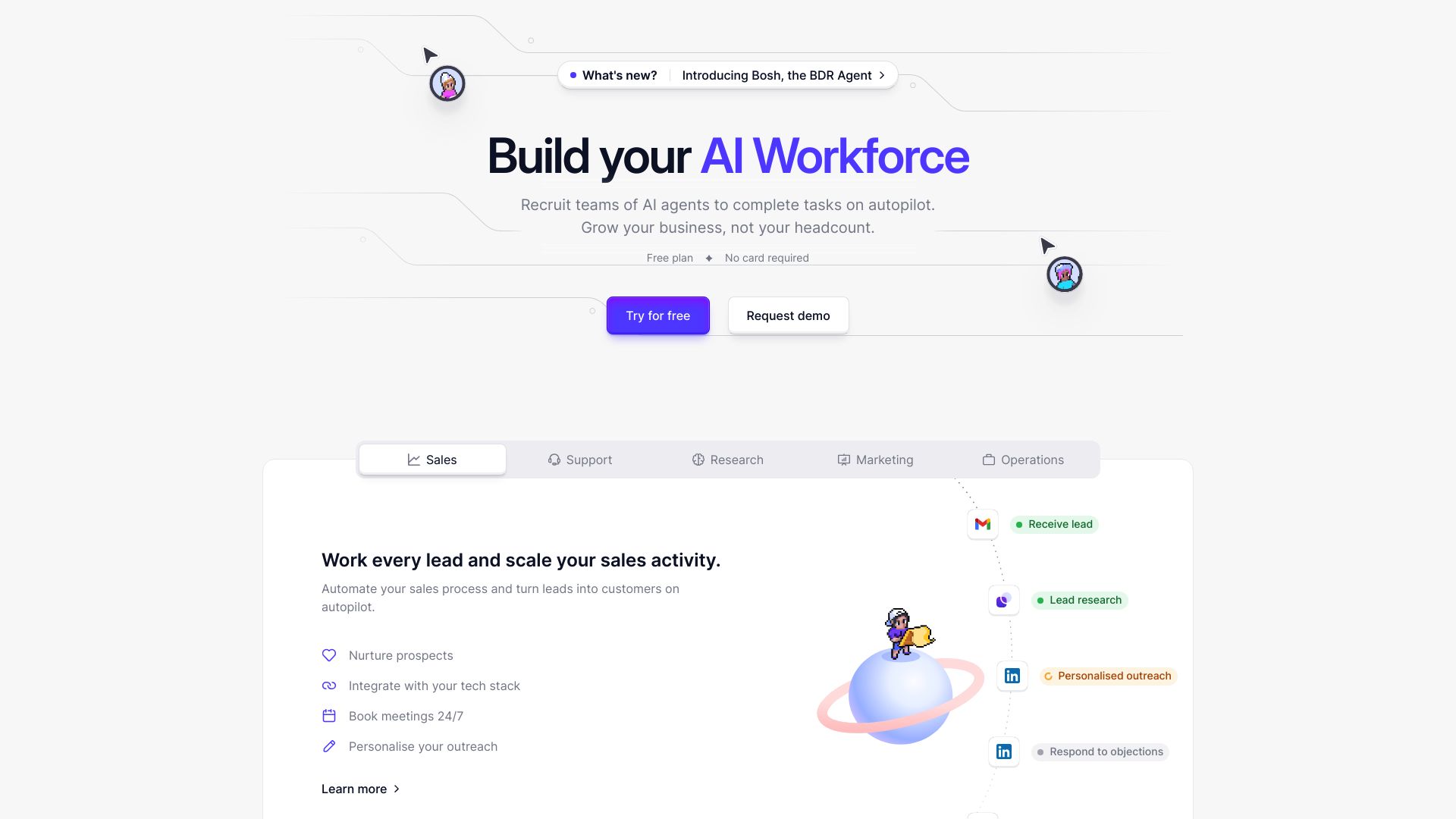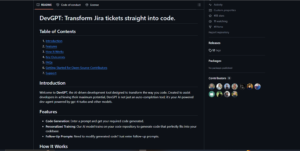Relevance AI vs. DevGPT: Comparing AI Development Platforms
AI agents and tools revolutionize software development, automating tasks and enhancing productivity. Relevance AI vs. DevGPT emerge as powerful contenders in this space, each offering unique approaches to AI-driven development. This comparison explores their features, strengths, and limitations, helping developers, business leaders, and AI enthusiasts make informed decisions.
We’ll examine how these platforms tackle code generation, agent deployment, and integration capabilities, while also introducing SmythOS as a comprehensive alternative that combines the best of both worlds. Whether you’re a seasoned developer or a business leader exploring AI solutions, this analysis provides valuable insights into the evolving landscape of AI-powered development tools.
Relevance AI Overview
Relevance AI empowers users to build and deploy AI agents and tools with minimal coding. The platform caters to developers, business leaders, and non-technical professionals seeking to harness AI capabilities for various applications.


The platform’s low-code environment allows users to create custom AI agents within minutes. Multi-provider support offers flexibility in choosing and switching between Large Language Model providers. Relevance AI includes a built-in vector store for efficient text storage and retrieval, enhancing data handling capabilities.
Relevance AI’s ’Magic Deployment’ feature provides a fully managed service for deploying Large Language Model features, eliminating infrastructure and scaling concerns.
Relevance AI’s ’Magic Deployment’ feature provides a fully managed service for deploying Large Language Model features, eliminating infrastructure and scaling concerns. The platform also offers a type-safe and flexible SDK for building applications with Large Language Model features, ensuring robustness and adaptability.
While Relevance AI offers powerful tools for AI development, users should consider potential challenges. Integration complexity with existing systems, data privacy concerns, and the need for high-quality training data may pose difficulties. Additionally, the platform’s pricing structure and scalability options should be carefully evaluated to ensure alignment with specific project needs and budget constraints.
DevGPT Overview
DevGPT transforms natural language prompts into executable code, streamlining software development workflows. This open-source AI assistant integrates with GitHub and Jira, automating pull requests from tasks and tickets. DevGPT leverages GPT-4 and Codex to power its code generation capabilities, focusing primarily on serving individual developers and small teams.


DevGPT’s personalized training feature adapts to a developer’s coding style, enhancing output relevance. Users can provide feedback on generated code through comments, further refining results. The platform’s productivity boost saves developers significant time, with initial users reporting over 10 hours saved per week on repetitive coding tasks.
DevGPT’s personalized training feature adapts to a developer’s coding style, enhancing output relevance. Users can provide feedback on generated code through comments, further refining results.
While DevGPT offers powerful features for individual developers, it lacks some enterprise-level capabilities. The platform currently focuses on code generation and task automation, potentially limiting its applicability for complex, multi-faceted development projects. Additionally, as an open-source tool, DevGPT may not provide the same level of dedicated support and security features as commercial alternatives.
DevGPT’s vision aims to become an indispensable AI-powered coding companion for developers and software teams. The platform seeks to expand its accessibility from individuals to companies of all sizes, building an engaged community of users and contributors to drive future product development. This community-driven approach could lead to rapid improvements and feature additions, but may also result in less predictable development cycles compared to commercial offerings.
Feature Comparison
Relevance AI and DevGPT offer distinct approaches to AI agent development, each with unique strengths and limitations. Relevance AI provides a comprehensive platform for building and deploying AI agents across various environments, including both development and production. Its visual builder and no-code editor make it accessible to users with minimal coding experience. In contrast, DevGPT focuses primarily on code generation from natural language prompts, catering more specifically to software developers.
While both platforms support AI agents, Relevance AI’s offering appears more robust, with features like autonomous agents, multi-agent collaboration, and human-AI interaction. DevGPT, on the other hand, excels in personalized training that adapts to a developer’s coding style. This difference highlights a key gap: Relevance AI provides a broader suite of AI capabilities, while DevGPT specializes in code-centric tasks.
In terms of security, Relevance AI includes features like data encryption, OAuth support, and IP control. DevGPT’s documentation does not explicitly mention these security measures, which could be a significant consideration for enterprise users. Additionally, Relevance AI’s support for various deployment options, including APIs, webhooks, and site chats, offers greater flexibility compared to DevGPT’s more focused approach on GitHub and Jira integrations.
Feature Comparison Table
| Relevance AI | DevGPT | SmythOS | |
|---|---|---|---|
| CORE FEATURES | |||
| Hosted Agents (Dev, Production) | ✅ | ❌ | ✅ |
| Environments (Dev, Production) | ✅ | ❌ | ✅ |
| Visual Builder | ✅ | ❌ | ✅ |
| No-Code Options | ✅ | ❌ | ✅ |
| Autonomous Agents | ✅ | ❌ | ✅ |
| Explainability & Transparency | ❌ | ❌ | ✅ |
| Multimodal | ✅ | ❌ | ✅ |
| Multi-Agent Collaboration | ❌ | ❌ | ✅ |
| Audit Logs for Analytics | ❌ | ❌ | ✅ |
| Work as Team | ❌ | ✅ | ✅ |
| Bulk Work | ✅ | ❌ | ✅ |
| Agent Work Scheduler | ✅ | ❌ | ✅ |
| Logs & Monitoring | ✅ | ❌ | ✅ |
| SECURITY | |||
| Constrained Alignment | ❌ | ❌ | ✅ |
| Data Encryption | ✅ | ❌ | ✅ |
| OAuth | ✅ | ❌ | ✅ |
| IP Control | ❌ | ❌ | ✅ |
| COMPONENTS | |||
| Foundation AIs | ✅ | ❌ | ✅ |
| Huggingface AIs | ❌ | ❌ | ✅ |
| Zapier APIs | ❌ | ❌ | ✅ |
| All other APIs, RPA | ✅ | ❌ | ✅ |
| Classifiers | ✅ | ❌ | ✅ |
| Logic | ✅ | ❌ | ✅ |
| Data Lakes | ❌ | ❌ | ✅ |
| DEPLOYMENT OPTIONS (EMBODIMENTS) | |||
| Deploy as API | ✅ | ❌ | ✅ |
| Deploy as Webhook | ✅ | ❌ | ✅ |
| Staging Domains | ✅ | ❌ | ✅ |
| Production Domains | ✅ | ❌ | ✅ |
| API Authentication (OAuth + Key) | ✅ | ❌ | ✅ |
| Deploy as Site Chat | ✅ | ❌ | ✅ |
| Deploy as Scheduled Agent | ✅ | ❌ | ✅ |
| Deploy as GPT | ✅ | ❌ | ✅ |
| Scalability | ✅ | ❌ | ✅ |
| DATA LAKE SUPPORT | |||
| Hosted Vector Database | ✅ | ❌ | ✅ |
| Sitemap Crawler | ❌ | ❌ | ✅ |
| YouTube Transcript Crawler | ✅ | ❌ | ✅ |
| URL Crawler | ❌ | ❌ | ✅ |
| PDF Support | ✅ | ❌ | ✅ |
| Word File Support | ✅ | ❌ | ✅ |
Best Alternative to Relevance AI and DevGPT
SmythOS stands out as the superior alternative to Relevance AI and DevGPT, offering a comprehensive platform for AI agent development and deployment. Our drag-and-drop interface enables users to create sophisticated AI workflows without extensive coding knowledge, democratizing AI development across various skill levels.
Unlike Relevance AI’s limited multi-agent capabilities and DevGPT’s narrow focus on code generation, SmythOS provides robust support for multi-agent orchestration. This feature allows teams of AI agents to collaborate on complex tasks, significantly enhancing efficiency and scalability in AI implementations.
SmythOS provides robust support for multi-agent orchestration … allowing teams of AI agents to collaborate on complex tasks, significantly enhancing efficiency and scalability in AI implementations.
SmythOS excels in its extensive integration ecosystem, supporting a wide array of APIs, AI models, and tools. This flexibility ensures seamless integration with virtually any workflow or business process, addressing a key limitation in both Relevance AI and DevGPT. Our pre-built API integrations and templates further reduce setup time, allowing users to focus on innovation rather than configuration.
In terms of deployment options, SmythOS offers unparalleled versatility. We support deployment across various platforms, including as APIs, webhooks, site chats, and even as ChatGPT plugins or Alexa skills. This breadth of options surpasses the capabilities of both Relevance AI and DevGPT, enabling users to integrate AI solutions into existing systems seamlessly.
Security and scalability, often overlooked by competitors, are top priorities for SmythOS. We provide robust data encryption, OAuth support, and IP control features, ensuring that your AI implementations remain secure and compliant. Our platform is designed to scale effortlessly, supporting enterprise-level deployments without compromising performance—a critical advantage over both Relevance AI and DevGPT.
Conclusion
Relevance AI and DevGPT offer unique approaches to AI-powered development, each with distinct strengths. Relevance AI provides a comprehensive platform for building and deploying AI agents, while DevGPT specializes in code generation from natural language prompts. Both tools aim to streamline development processes, but cater to different user needs.
While Relevance AI and DevGPT have their merits, SmythOS emerges as the superior choice for businesses seeking a robust, scalable AI solution. Our platform combines the best of both worlds — offering a user-friendly interface like Relevance AI and powerful code generation capabilities reminiscent of DevGPT. SmythOS goes beyond by providing unparalleled flexibility in deployment options, extensive integration capabilities, and advanced features like multi-agent collaboration.
SmythOS stands out with its ’Create Once, Deploy Anywhere’ philosophy, allowing users to build AI agents that seamlessly integrate across multiple environments. This versatility, combined with our comprehensive security measures and scalable infrastructure, makes SmythOS the ideal choice for businesses of all sizes looking to harness the full potential of AI.
Ready to revolutionize your AI development process? Explore our diverse range of AI-powered agent templates to jumpstart your projects, or create a free SmythOS account to experience the future of AI automation firsthand. With SmythOS, you’re not just adopting a tool — you’re embracing a new era of AI-powered innovation.
Last updated:
Disclaimer: The information presented in this article is for general informational purposes only and is provided as is. While we strive to keep the content up-to-date and accurate, we make no representations or warranties of any kind, express or implied, about the completeness, accuracy, reliability, suitability, or availability of the information contained in this article.
Any reliance you place on such information is strictly at your own risk. We reserve the right to make additions, deletions, or modifications to the contents of this article at any time without prior notice.
In no event will we be liable for any loss or damage including without limitation, indirect or consequential loss or damage, or any loss or damage whatsoever arising from loss of data, profits, or any other loss not specified herein arising out of, or in connection with, the use of this article.
Despite our best efforts, this article may contain oversights, errors, or omissions. If you notice any inaccuracies or have concerns about the content, please report them through our content feedback form. Your input helps us maintain the quality and reliability of our information.
